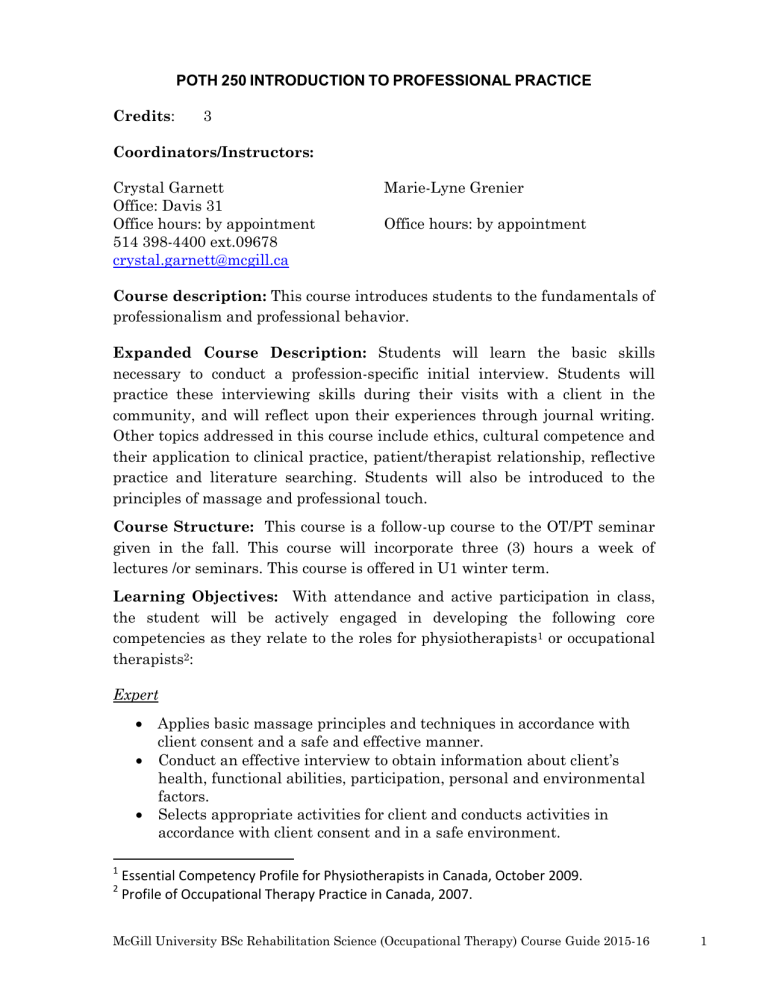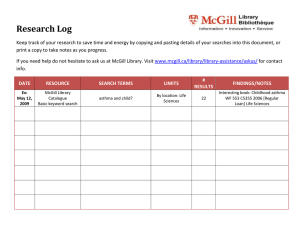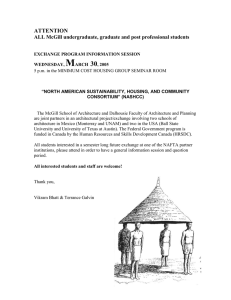POTH 250: Intro to Professional Practice - McGill Course Guide
advertisement

POTH 250 INTRODUCTION TO PROFESSIONAL PRACTICE Credits: 3 Coordinators/Instructors: Crystal Garnett Office: Davis 31 Office hours: by appointment 514 398-4400 ext.09678 crystal.garnett@mcgill.ca Marie-Lyne Grenier Office hours: by appointment Course description: This course introduces students to the fundamentals of professionalism and professional behavior. Expanded Course Description: Students will learn the basic skills necessary to conduct a profession-specific initial interview. Students will practice these interviewing skills during their visits with a client in the community, and will reflect upon their experiences through journal writing. Other topics addressed in this course include ethics, cultural competence and their application to clinical practice, patient/therapist relationship, reflective practice and literature searching. Students will also be introduced to the principles of massage and professional touch. Course Structure: This course is a follow-up course to the OT/PT seminar given in the fall. This course will incorporate three (3) hours a week of lectures /or seminars. This course is offered in U1 winter term. Learning Objectives: With attendance and active participation in class, the student will be actively engaged in developing the following core competencies as they relate to the roles for physiotherapists1 or occupational therapists2: Expert 1 2 Applies basic massage principles and techniques in accordance with client consent and a safe and effective manner. Conduct an effective interview to obtain information about client’s health, functional abilities, participation, personal and environmental factors. Selects appropriate activities for client and conducts activities in accordance with client consent and in a safe environment. Essential Competency Profile for Physiotherapists in Canada, October 2009. Profile of Occupational Therapy Practice in Canada, 2007. McGill University BSc Rehabilitation Science (Occupational Therapy) Course Guide 2015-16 1 Communicator Employs effective and appropriate verbal and nonverbal communication with clients, peers and educators. Listens effectively and demonstrates an awareness of self-behaviors and the responses of others and adapts communications appropriately. Collaborator Establishes and maintains interprofessional relationships, which foster effective collaborations. Demonstrates an understanding of and respects the differing perspectives during collaborative activities. Advocate/Change agent Begin to identify the health needs and concerns of individual clients. Scholarly practitioner Apply basic principles of reflection and reflective practice Apply basic literature search principles Professional Identify and explain the roles that occupational and physical therapists play in primary health care List and define the principles of professionalism in health care List and define the major principles of cultural competence and how they apply to various client scenarios Course Content: This course is a follow-up course to the OT/PT seminar given in the fall. It introduces students to the fundamentals of professionalism. It also introduces the concept of cultural competence and how it applies to clinical practice. In this course students will develop the basic skills necessary to conduct an initial interview with a client by practicing these skills during client visits with an individual in the community. Specific topics addressed in the course include interviewing, massage, journal writing and portfolio development. A detailed weekly schedule will be provided during the introductory lecture. Course Materials: No text is required for this course. A list of suggested and required readings, handouts and lecture notes will be posted on MyCourses. McGill University BSc Rehabilitation Science (Occupational Therapy) Course Guide 2015-16 2 Copyright of course materials: Instructor generated course materials (e.g., handouts, notes, summaries, exam questions, etc.) are protected by law and may not be copied or distributed in any form or in any medium without explicit permission of the instructor. Note that infringements of copyright can be subject to follow up by the University under the Code of Student Conduct and Disciplinary Procedures. Student Assignment and Evaluation: Student evaluation will be done in an ongoing format throughout the term and will include both formative and summative evaluations. Mark distribution to be determined Special Requirements for Course Completion and Program Continuation: In order to pass the course, a grade of at least C+ (60%) must be obtained as a total course mark. Please refer to the appropriate sections in the undergraduate calendar on University regulations regarding final and supplemental examinations. This course falls under the regulation concerning individual and group evaluation. Please refer to the section on marks in the Rules and Regulations for Student Evaluation and Promotion of the Occupational Therapy Course Guides. Plagiarism/Academic Integrity: [Amended by Senate on April 17, 2013]: McGill University values academic integrity. Therefore all students must understand the meaning and consequences of cheating, plagiarism and other academic offences under the Code of Student Conduct and Disciplinary Procedures. Right to submit in English or French written work that is to be graded: In accord with McGill University’s Charter of Students’ Rights, students in this course have the right to submit in English or in French any written work that is to be graded. Skills Building Attendance Mark: Attendance at all seminars and site visits (literature searching workshop, shadowing visit, SIM centre, massage seminars, and client visits) is mandatory. Students will not be able to miss more than 15 % (i.e. more than 1 per term) of these activities without a written excuse. If they do, 10% of the total course mark will be removed. Consequences of not completing assignments as requested: Late submissions will be penalized 5% per day, including weekends. McGill University BSc Rehabilitation Science (Occupational Therapy) Course Guide 2015-16 3 Dress Code: Professionalism with respect to dressing is encouraged throughout the course of the semester. It is each student’s responsibility to have appropriate attire during all class assignments and learning activities. When working with clients or during site visits student must be dressed professionally. Disability: If you have a disability please contact the instructor to arrange a time to discuss your situation. It would be helpful if you contact the Office for Students with Disabilities at (514) 398-6009 before you do this. Technology in Class: Your respectful attentive presence is expected, therefore while you are permitted to use your laptop in class, it is understood that you will not be using your laptop or cell-phone for social purposes during class time (e.g. email, msn, sms). Your cell phone should be on silence during class time and phone calls should only take place during the break or after class. Course evaluations: End-of-term course evaluations are one of the ways that McGill works towards maintaining and improving the quality of courses and the student’s learning experience. You will be notified by e- mail when the evaluations are available on Mercury, the online course evaluation system. Please note that a minimum number of responses must be received for results to be available to students. In the event of extraordinary circumstances beyond the University’s control, the content and/or evaluation scheme in this course is subject to change. McGill University BSc Rehabilitation Science (Occupational Therapy) Course Guide 2015-16 4


